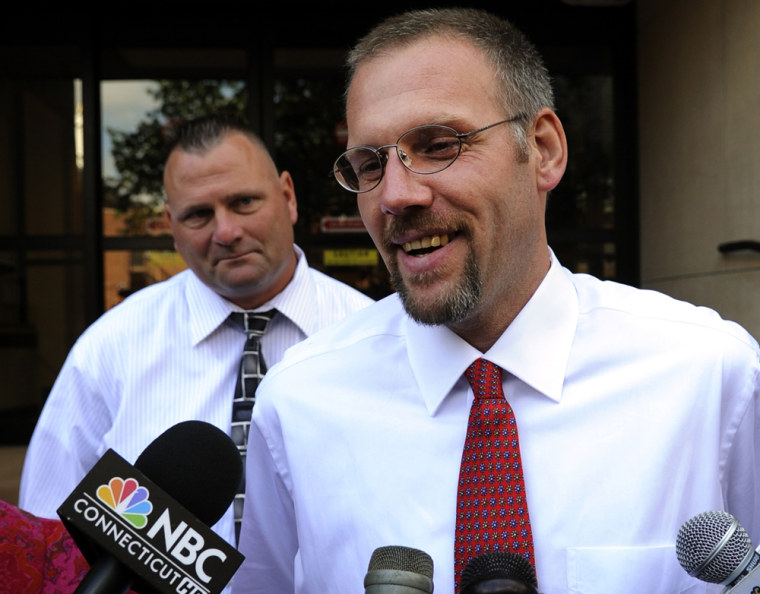Kenneth Ireland recently got a good look at himself in a real mirror for the first time in more than 20 years, and realized just how much he had aged in prison.
A Connecticut judge on Wednesday dismissed murder and rape charges against Ireland, after DNA tests showed he could not have committed the crime.
"It was a surreal moment," Ireland told The Associated Press on Thursday in his first in-depth interview since being released from prison. "I've never been outside in such an open environment without handcuffs and shackles. I didn't have to ask permission to walk any where or move around as I pleased."
In prison, Ireland could only see fuzzy glimpses of his face through tiny plastic mirrors. When he was released from prison Aug. 5, he ate a steak lunch at a restaurant in New Haven with his attorney when he saw himself in a real, full-length mirror.
"My first reaction was 'Who's that old guy?'" the 39-year-old recalled. "Every time I'd see the mirror, I'd get distracted. I think of myself looking like when I was 18."
When Ireland was sent to prison for 50 years in 1988, he had never used a cell phone, the Internet or even played music from a CD.
"I equate it to sort of waking up out of a coma," Ireland said. "I knew there were things out there. I just never experienced them."
'A whirlwind and a shock'
Ireland was working in a Subway sandwich shop and was planning to join the National Guard when Wallingford police charged him with the 1986 rape and murder of Barbara Pelkey, a mother of four. Her nude body had been found at the former R.S. Moulding and Manufacturing Co. in Wallingford, where she worked alone at night.
"The whole thing was a whirlwind and a shock," Ireland said. "I was young, so I didn't understand how the system worked."
Ireland, who grew up in Coventry and lived in Wallingford, still remembers the disbelief and anger he felt when he was sentenced.
"You put a certain amount of faith in the system. I felt I was let down," he said.
Ireland was sent to overcrowded maximum security prisons. He and his cellmate shared a 6-foot-by-12-foot cell with two bunk beds, a desk and a toilet.
"You just have to conduct yourself in such a manner you can survive it," Ireland said. "You naturally adapt to situations. There's a lot of boredom in prison. I read a lot." He also joined a music program to play guitar and took courses in ecology, creative writing, art history and accounting.
Since he's been out of prison, Ireland said he's tried to use the Internet for the first time. He is fascinated by grocery stores, noting an aisle full of toothpaste instead of the two choices in the prison commissary.
"There's so much, the colors," he said. "It's like a tourist in a big city looking at the big buildings."
Working way back into life
He is focused on finding an apartment and getting his driver's license and a car. He believes the state should create a program to support inmates who are exonerated by helping them find housing, jobs and clothing.
"When I came out of prison I had absolutely nothing," Ireland said.
Ireland said he is especially grateful to the Connecticut Innocence Project, which represented him; the law firm McCarter and English, which supported the project; and his family and friends for staying by his side.
"They literally held my hands through this," Ireland said. "I don't know where I'd be without their support."
He and his attorney, Karen Goodrow, would not comment on whether he will sue, as other wrongly imprisoned inmates have done. He said he's not sure of his future plans yet. "Just become a productive member of society," he said.
'What happened happened'
New Haven State's Attorney Michael Dearington said the investigation in Pelkey's rape and murder has been reopened. He agreed with the dismissal of the charges and said there was no chance Ireland would be recharged.
Ireland is the third Connecticut inmate freed from prison in the past three years based on new DNA testing. The Connecticut Innocence Project represented all three men. More than 240 people nationwide have had wrongful convictions overturned by DNA testing, according to the group.
Ireland said he's trying to move past anger.
"What happened happened and I can't change it," Ireland said. "There's really no sense throwing myself at that wall. I have to live with it and I have to move on. It's not going to control who I am."
More on DNA exonerations
